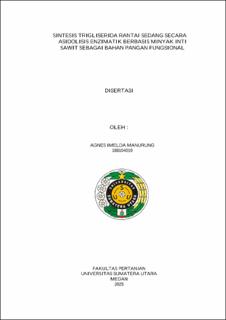Sintesis Trigliserida Rantai Sedang secara Asidolisis Enzimatik Berbasis Minyak Inti Sawit sebagai Bahan Pangan Fungsional
Synthesis of Medium-Chain Triglycerides using Enzymatic Acidolysis Based on Palm Kernel Oil as a Functional Food Ingredient

Date
2025Author
Manurung, Agnes Imelda
Advisor(s)
Julianti, Elisa
Silalahi, Jansen
Siahaan, Donald
Metadata
Show full item recordAbstract
Medium-Chain Triglycerides (MCT) is a form of structured lipid with a composition of Medium-Chain Fatty Acids (MCFA/C6-C12) esterified on the glycerol backbone. MCT is different from Long-Chain Triglycerides (LCT) because of the unique physiological and functional properties which are widely used as functional oils or nutraceuticals in various food and pharmaceutical formulations so they have great potential for development. The main objective of this research was that synthesis of MCT as a functional food ingredient using enzymatic acidolysis based on palm kernel oil (PKO). To respond this objective, several research stages were conducted, including: (1) analyzing the physicochemical characteristics of PKO as MCT raw material; (2) analyzing the conditions of the enzymatic acidolysis reaction using the non-specific NS 400190 lipase enzyme at various treatments of time, temperature and substrate ratio in MCT synthesis. This analysis will create information about the remaining activity of the enzyme; (3) determining optimum process conditions in MCT synthesis using the response surface methodology (RSM); (4) analyzing MCT activity as an antimicroorganism agent in vitro.
In the initial stage, PKO characterization was conducted that included water content, free fatty acid content, melting point, saponification number, fatty acid composition, iodine number, glyceride composition and triglyceride (TG) profile. The next stage was to analyze the conditions of the enzymatic acidolysis reaction at various treatments of time, temperature and substrate ratio in MCT synthesis. The enzymatic acidolysis reaction was conducted using the non-specific NS 400190 lipase enzyme as a biocatalyst, PKO as a source of TG molecules and lauric acid as a MCFA donor. The reaction was conducted at a temperature of 44-104oC, during 0-48 hours, and a substrate ratio of 1:1 – 1:11 (molar ratio), so that the right conditions were obtained for MCT synthesis. Apart from that, the stability of the NS 400190 enzyme in catalyzing MCT synthesis was also studied. The next stage was a statistical optimization analysis of MCT synthesis using the Minitab 18 RSM application of the Box-Behnken design type with the parameters (highest-lowest). Consecutively the temperature ranged 44-94oC, the duration ranged 4-24 hours, and the substrate ratio (molar ratio) ranged 1:1 – 1:9. The final stage analyzed the activity of MCT as an antimicroorganism agent in vitro as a potential functional food ingredient.
The research result showed that PKO was an oil rich in medium-chain fatty acids (C8-C12) around 52.74% and MCT (Equivalent Carbon Number = 32-36), namely ± 37%, so it could be used as a substrate for MCT production. The synthesis of MCT using enzymatic acidolysis showed that treatment time, temperature and substrate ratio had a significant effect on the concentration of lauric acid in TG. The stability value of the lipase enzyme NS 400190 was based on the half-life value of 50%, namely 761.23 hours in the acidolysis reaction. This meant that the affinity of
vi
the lipase enzyme for the substrate was high. The optimization of MCT synthesis was conducted statistically using the Minitab 18 RSM Box-Behnken design type application with a response model for lauric acid concentration in TG. The optimum condition obtained was a reaction temperature of 94oC, a reaction time of 16.52 hours, and a substrate ratio of 1:9. On these conditions, it is estimated that the concentration of lauric acid in TG was 93.77%. The verification results under these conditions were not too different from the model estimated value, where the concentration of lauric acid in TG obtained was 87%. The results of antimicrobial tests on TG, diglycerides (DG), and monoglycerides (MG), which were the result of fractionation of acidolysis products, showed that TG did not have antimicrobial activity with an antimicrobial index of 0 mm, while DG and MG had antimicrobial activity with antimicrobial index values respectively as many as 1,755 mm and 2,285 mm.
